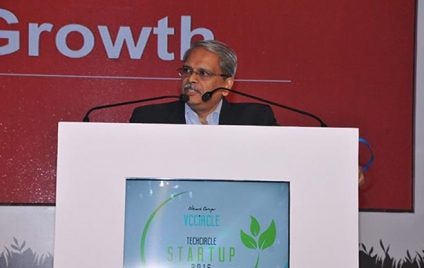The principles of founders, their execution capability, financial discipline and deep understanding among founders are some of the key elements in building great enterprises, according to Infosys co-founder Kris Gopalakrishnan.
“To me running a business is all about leadership, the founders, what kind of leadership that you have, qualities that you have, what principles you have. Because the company will be built around these principles,” he said in his keynote address at the Techcircle Startup 2016 summit in Bangalore.
Gopalakrishnan, also an active investor in startups, said the founders will have significant influence on what kind of company they build. “If you look at the Infosys experience, it is based on our principles, the kind of values and ethics we have held,” he said.
Gopalakrishnan explained the relationship dynamics among Infosys founders as he offered success tips to entrepreneurs. “The leadership team must have similar goals, values, objectives and I would even say, lifestyle,” he said. They should have a “similar horizon for what they want to achieve next and what they define as success… One person left us in 1989 thinking we were not successful enough but the remaining six stayed. We had rules for engagement, rules for decision making and respect for each other; we gave space to each other so that we didn’t step on each other,” he added.
Gopalakrishnan was one of seven first-generation entrepreneurs led by NR Narayana Murthy who co-founded Infosys in 1981. He was the third co-founder of Infosys, India’s second-largest software services exporter, after Murthy and Nandan Nilekani to become managing director and CEO. As Infosys grew to become a multi-billion-dollar company over three decades from its humble beginning from a residential colony in Pune, the founders too rose to become billionaires.
After retiring as executive vice chairman in October 2014, Gopalakrishnan has been a startup evangelist and investor. He is a co-founder of seed-investor-cum-accelerator Axilor Ventures, a member of the Indian Angel Network and an adviser to VC firm IDG Ventures. Individually and through funds that he is associated with, Gopalakrishnan has co-invested in around 30 startups in the past two years.
Lonely journey
Gopalakrishnan suggested having two or more founders for startups. “The journey is very lonely. So I would advise you to have at least one other person. You know at some point you need to take a break, you need to relax and you need somebody (to fill in the gap). How many is too many I don’t know,” he said.
Recounting some of the earliest decisions that Infosys had taken, Gopalakrishnan said even the choice of location plays a role in the success of an enterprise.
“When we started Infosys in 1981, we were in Mumbai and our registered office was in Pune but our first customer was in Bangalore. We moved to Bangalore in 1983 and [we had] no regret,” he said. “If we had stayed in Bombay we might have done well but the advantage was that we were a story in Bangalore. We would not have been a story in Bombay,” he added.
For startups, Bangalore offers several advantage in terms of an ecosystem, incubators, VCs, academic institutions and research organisations of multinational companies, said Gopalakrishnan. “It is truly an amazing ecosystem, which I dare say the Silicon Valley does not provide. R&D institutions are not there in Silicon Valley; (in Bangalore) there are hundreds of R&D centres of automotive to aerospace to pharma to hardware, software services etc,” he said.
Gopalakrishnan also advised startups to be agile and adapt to survive. “When Infosys was started, telecommunication links were not there. How will a global delivery model succeed without telecommunication? We would ship the magnetic tapes through courier; it took 14 days to reach the US. That was the global delivery model when we started,” he recounted. “We had to suit the product we had to the strength and capability we had and the technology available and still find a customer who would buy our product.”
Flawless execution is the single most important factor that determines the success of a company, he said, adding that 85-90% of success depends on execution. Gopalakrishnan also highlighted the importance of financial discipline and predictability in business. “We had a formula we rigorously followed. First, your numbers have to be predictable. Forecast your revenue and profit and you must meet those numbers. That allows you to confidently plan for the future,” he said.
“I put luck last,” he said. “However good, smart and intelligent you are and the right product you have, there is an element of luck. But you can increase your odds for success. The key thing is you do everything right so that the luck favours you.”
Author: Manu P Toms
Source: http://techcircle.vccircle.com/2016/04/29/starting-up-the-infosys-way/





